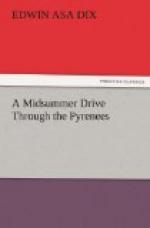CHAPTER XVII.
OUT TOWARD THE PLAIN.
“How
the golden light
On those mountain-tops makes them strangely
bright.”
—The Pyrenees Herdsman.
We revolve an unhappy fact, as we ramble on along the brilliant Allee, this clear summer evening. We are no longer among the time-wealthy. With Barcelona and the Mediterranean in prospect, we cannot draw further in Luchon upon our reserve of days. The evening is flawless; the stars blaze overhead like the burst, of a rocket; the promise of the morrow is beyond doubt, and the Col d’Aspin is yet to be reconquered. We come back across the park to our pleasant rooms in the Richelieu; and a conclave ends in a summons to a livery-man and the order for carriages for a to-morrow’s return to Bigorre.
Early rising is therefore enforced, without regard to resentment, the next morning, for we are to drive through within the day, not making a night’s break as before at Arreau. There are thus the two hard cols to cross, one in the forenoon, the other in the afternoon; and the horses must have a long mid-day rest to accomplish the task. So the Allee-d’Etigny is just taking down, the shutters, as we prepare to drive away from the hotel; the dew is still dampening the walks; domestics are scouring entrance-ways and windows, a few early guides and drivers look wistfully at the departing possibilities. We are unfeignedly sorry to leave Luchon. But we exult in compensation over an unclouded day for the Col d’Aspin.
By the usual mysterious Continental system of telegraphy, the fact has spread that we are going, and even at this unseasonable hour the entire working force of the Richelieu, portier, waiter, head-waiter, maids, buttons, boots and bagsman line up to do us reverence. We pass from hall to carriages through a double row of expectants. It is a veritable running of the gauntlet, save that in running it we give rather than receive. Unlike recipients in most other parts of Europe, however, the servants here have the air of expecting rather than of demanding, and take what is given more as a gift than as a right. So we depart in the comfortable glow of benefaction, rather than in the calmer consciousness of indebtedness baldly paid.
We reach the foot of the first col, the Peyresourde, with views at the left of the distant glaciers above the Lac d’Oo, wind up to the crest as the morning wears on, and by noon have scudded down by the other side and are again at Arreau. It is a fete-day throughout France, and as we drive into the town we find the plain little street transformed into a bloom of flags and flowers and tri-colored bunting. On every side, as we stroll out later from the inn, the shops and houses are fluttering the red, the white and the blue, colors as dear to the American eye as to the French. Boughs and garlands festoon the archways; the neighborhood has flocked to the town in holiday finery, the cabarets or taverns are driven with custom, the nun-like town is become a masquerader. The scene is so different from that of the cold, grey morning on which we left for Luchon, that we vividly see how impressions of place as of person may change with the change of garb and mood.




